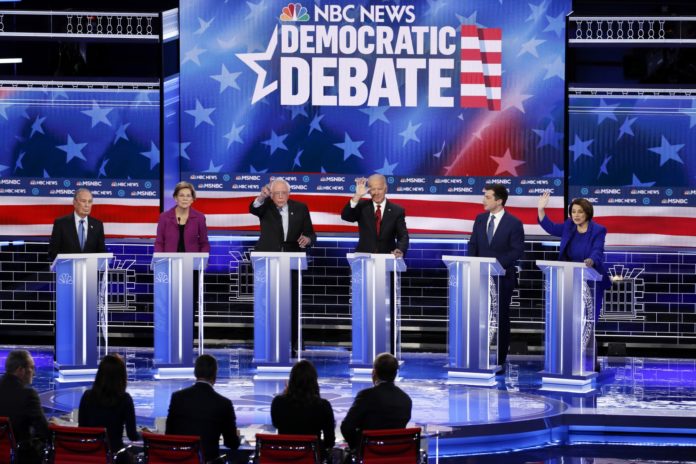
By Matthew Soderberg | Sports Writer
In the upcoming Texas primary, healthcare is set to be a hotly contested issue as voters head to the polls.
In a Gallup poll from April 2019, 80% of people polled said they worry a “fair amount” about healthcare availability, and in the recent Nevada Caucuses, CNN said over 40% of people polled said their biggest concern going in was healthcare.
The Hankamer School of Business features many economics professors who study the healthcare industry.
Dr. Michael Richards and Dr. Mark Kelly are two associate professors in the department that have researched the area, and Richards said a main problem is the rising prices people are spending as a whole.
“A lot of individuals are not seeing a lot of wage growth, so their take-home pay is not increasing over recent years,” Richards said. “But at the same time, the amount that they’re spending on their health insurance is, and it’s outpacing inflation. Affordability is kind of what’s on everyone’s mind, and that’s ultimately going to shape how we think about health policy reforms.”
According to a Forbes article from December 2018, Americans spent about $3.5 trillion on healthcare in 2017: about 17.9% of GDP, and prices on healthcare rose about 1.6%.
“One of the issues that we have is it’s very fragmented,” Richards said. “Depending on small changes in individuals’ or households’ circumstances can dramatically change if they can access health insurance, and if so, what type. Is it Medicaid or is it privately insured? Is it through their employers or through the individual market? You turn 65 and we throw you in a Canadian system.”
The “Canadian system” is Medicare, a program for individuals over the age of 65 that pays for basic medical expenses. It can also be supplemented with private plans such as Parts A, B and D, which cover hospital expenses, medical expenses and prescriptions, respectively.
Both Richards and Kelly said they expressed concern in any sort of Medicare for All plan’s feasibility, while Richards said Joe Biden’s plan to bolster the Affordable Care Act would only take “incremental changes.” Richards also said the plan for a public option, supported by Mike Bloomberg, Pete Buttigieg, Amy Klobuchar and Tom Steyer, is more feasible due to other states already implementing that sort of plan.
Kelly said Americans should be cautious of jumping into a drastic change without realizing the consequences.
“You pay a copay or some sort of co-insurance rate like you would under normal kinds of health insurance, and then the government covers the rest,” Kelly said. “If they are literally saying we want to just do Medicare, but for everybody, then that’s what that would look like, and so … since I’m the macroeconomist in the room, my perspective would be how are you going to finance that, and what kind of impact would that have on the rest of the economy?”
This is the big question many Americans have for candidates like Sen. Bernie Sanders whose rallying cry for Medicare for All is the sounding board for his candidacy. Sanders has been transparent with his plan to raise taxes for both the wealthy and the middle class, but Kelly says there are side effects for taxes other than just financial cost.
“Taxes, depending on the types of taxes you use, have a major impact on how people make decisions,” Kelly said. “From how much time do I spend in the labor force, to how much do I save and invest, whether it’s businesses investing or households saving money in the stock market and other areas, which has long-run ramifications.”
Kelly said there are also downsides to using a government-funded system such as price caps, maximum prices the government will pay for a procedure.
“If you’re putting price caps, then you’re not really allowing the market to work,” Kelly said. “The kick out there is if you’re reducing prices to help control your costs … then I think the issue that you would see is a shortage of healthcare.”
Kelly said the American system works because there is competition and price flexibility. Richards said if that is taken away, it risks the forward progress that has driven America to the forefront of modern medicine.
“We can do things that we could not do before,” Richards said. “We’re able to cure things that were incurable before, and so innovation is something to be celebrated, but at the same time, we see other price trends that don’t seem to reflect underlying innovation and scientific discovery, things like anti-competitive practices.”
Richards’ said he has his own hesitations towards a public option. Richards said that would add one more player into an already crowded system, potentially leading to more inefficiency.
“It actually just balkanizes health insurance delivery one more time,” Richards said. “So we’re already this fragmented system where if you lose your job, you lose your insurance. If you change jobs, you’ve got to get new insurance. If you’re a seasonal employee, you’re going to cycle in and out … and so the public option is just layering one more element to that, which creates all sorts of complications.”
There is never an option that is going to satisfy everyone. That’s the nature of a healthy political atmosphere. Richards said, in the end, it’s about finding out who is being honest and upfront with their plan and how to enact it.
“It is never more effective to talk the numbers,” Richards said. “I think it’s up to the American public, to put more and more pressure on candidates from either party or from no party at all to state clearly and pragmatically what it is they want to do.”





